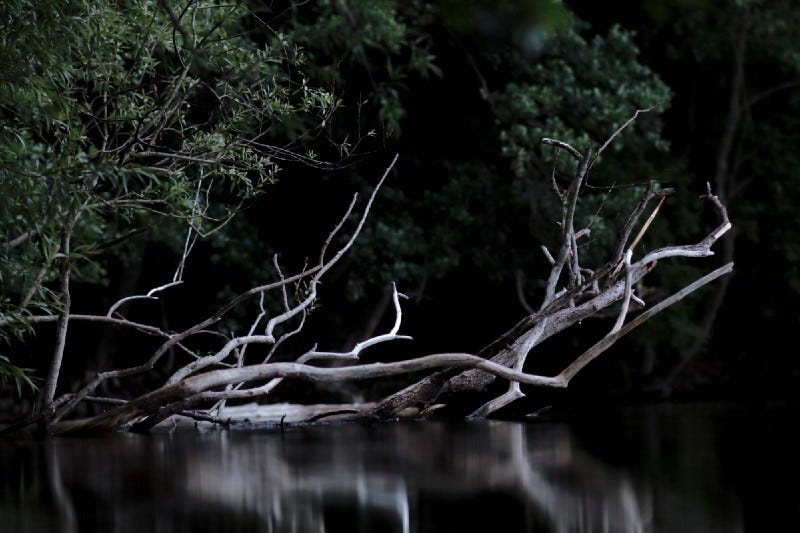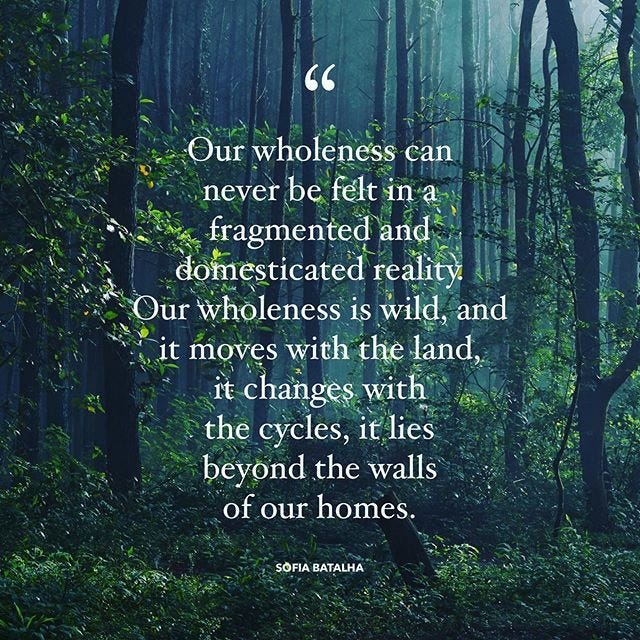
This article was originally written in Portuguese on November 17th 2020. You can read it here.
When working with other people, I’ve been journeying through a giant hole —a huge abyss between our needs and the necessities of the living, complex, and fascinating system sustaining us.
Here in the global north, we keep engulfed in modern assumptions, avoiding the violent and problematic realities that permeate our moment. We keep subtracting ourselves from the context, repeatedly reclaiming the walls that fragment us. We are concerned about the harmony of this inner world. We keep relying on the domesticated experience, trying to find value and purpose within the small and superficial reality, with the illusion that this modern life is the only real one.
These walls contain us and do not let us in or out. We become exiled from the very system that literally creates, nourishes, and sustains us. We lose touch with the relations of things. Becoming fixated on the objects instead of what connects them or us. And so, our goals become narrow and small in the broader scheme of things. This is not an individual defect but a deafening cultural challenge.
This layer of “simple and controlled” existence walls us out of the conscious reality that is always moving in organic cycles, always mutating and changing. Walls don’t accommodate change because of their foundation; they exist to prevent mutations.
Chaos, decomposition, destruction, and violence are all part of the original pattern of every lifecycle. We cannot avoid them. We are part of them, whether we like it or not. Grieving, on the other hand, is our built-in tool to deal with these harsh life movements, to pass through them, change, and connect. To be able to find new paths and paradigms, always humble and in relation to all there is.
The world is crumbling, and systems are collapsing. Large-scale pollution, toxicity, threatening loss of biomass, systematic injuries, imprisoning all living systems, and the insidious genocides and all-around ecocides. All of us feel this deep inside, but sometimes mistake it for sadness or some emotion passing by. Each one of our singular consciousnesses is interwoven with the world and cosmic-chthonic-consciousness. Our emotions are not just ours. They’re the world creating and grieving itself. They’re the humans, animals, plants, and landscapes crying their losses. Our walls cannot contain that.
Many of us aspire to feel whole again, even though we have never felt it before. But we long for it. We miss it. And we look for ways to feel it again with therapy, consultations, books, or learning new skills. Usually, it implies or needs some sort of life-changing event. But our wholeness can never be felt in a fragmented and domesticated reality. Our wholeness is wild, and it moves with the land; it changes with the cycles; it lies beyond the walls of our homes. It is to be discovered in a radical and porous connection with all there is. It lives in the integral and vital flow of reality.
To be whole means to recover our perception of the world's destruction. To open our hearts to the violence perpetrated against nature, animals, plants, women, children, and other cultures. To let it all in.
To violently shake our bones, making us sob under the crushing weight of our blind neglect. To violently shake our bones, making us surrender to the visceral and ancient responsibility that shapes our place in the world. To violently shake our bones, making us remember.
Let us return to wholeness, mending the fabric of creation, beyond the walls. Remembering our humble place with all there is.
For how long will we keep avoiding grieving?
For how long will we keep severing radical connections?
For how much longer do we bear not feeling whole?
Granny's Dream
The midday heat made her sleepy. With her wild, rough skin warmed by the sun, Granny dozed off, falling into the dreams of the world, claiming deep memories, recollections of her long life. The daydream brought her back to when she was still sovereign, when men called her Elder. She missed the shady presence of ancient oak and chestnut trees and the fres…
Our Lady of Orada
First, a prayer, then a libation, and later an offering. To speak of Lady of Orada we need to dive deep into primal devotion and mineral body memory, not fearing the evanescent abyss. The heart-threads we will weave are frail and ancient, for we are venturing beyond the recent translation of this potent natural force and feral beings. The contemporary Ch…
Ancient Tales for Modern Times
For twenty years, I’ve been working with people and places, and I also write fabulated tales from pre-agrarian realities, echoing whispers from the land, recollecting shamanic ancient ways of life in the Iberian Peninsula. These contextual stories are not escapes from the perilous times we live in.
The sacred act of dissolving
The polymorphic body dissolves and tears. Transforms and dismantles. Dissipates Unties Dismembers Disintegrates The polymorphic body needs metamorphosis to remain whole. To merge with Life. To aggregate to the ground. To break and emerge. Metamorphosis is inevitable, but we do not always have a cocoon.









"We keep subtracting ourselves from the context, repeatedly reclaiming the walls that fragment us." this hit hard today, thank you
True; and the closer we become to Nature, the closer we become to our Selves. This includes the cycle of grief, pain, suffering, reconciliation, healing, love. Nowhere do we see dominance, destruction and conquering as a pathway to peace and harmony.